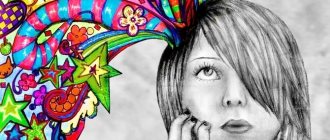Whoever has once found himself cannot lose anything in this world. And whoever once understood the person in himself understands all people
S. Zweig
Self-knowledge begins from the moment you become aware of yourself. This process is embodied very early, even in childhood, and reaches its peak in the years of adolescence, when the thirst for knowledge is great, the mind is insatiable, demands new discoveries and impressions, and the soul strives for high goals and it seems that it is possible to embrace the immensity.
All this is exactly so, but with the burden of responsibility that social status imposes, new responsibilities, and simply the daily whirlpool of events carries away with its speed, a person forgets about the purity of impulses that once filled his life with meaning. And now, realizing the vanity of existence, he looks back, sees himself in the past and realizes that something is missing in his present life. Is this why she began to seem ordinary to him, so predictable?
Yes, there is stability in it: he has achieved recognition of his merits, he is valued by colleagues and respected by friends, there is stability in the family and support in life. However, this vague feeling inside does not cease to excite us and the fact that all this surroundings, the external component of being, does not exhaust the diversity that life can offer us.
No matter how unique and beautiful the experience of living in society may be, constantly encouraging us to serve our egregor, nevertheless, the material component of life could not exist if there were no inner life, the one that happens inside, is manifested by the work of consciousness and mind. It is the most important thing in a person, what is hidden from view, but from where we draw strength to implement projects; she is a source of inspiration and creativity; the place where consciousness and soul live; a reflection of all that is purest in every person.
In moments of misunderstanding by others, it is this source that you will turn to in order to regain self-confidence. This is the inner pulse that connects us with the Absolute. It contains the entrance to the countless kingdom of knowledge and virtues. You need to be able to use it, find the key to it. The inner world of a person is huge. What we habitually call the inner world are just approaches to it. To recognize the entire Universe hidden behind the inscription “inner world,” we resort to a technique called self-knowledge.
Self-knowledge
The process of knowing yourself is called self-knowledge. It is formed throughout life, transforming depending on circumstances. A person’s self-knowledge is influenced by various factors, such as a person’s social status, his social roles, character and temperament, creative and physical abilities, and much more.
Personality formation occurs throughout life. A person is born, begins to explore the outside world and comes to realize himself as a separate person. In infancy, the child becomes aware of and accepts himself through his mother. Subsequently, he begins to understand that he is a separate person from her, begins to learn to accept and study himself, his body, behavior, and the reaction of others to him.
Psychologists argue that the influence of various factors on the process of self-knowledge is irreversible. Therefore, the more positive examples a child sees in childhood, the more thorough the process of self-knowledge will take place in his life.
Psychological dependence on various circumstances may also be associated with some difficulties in childhood.
With the process of personality formation, a person begins to understand what surrounds him, what reality he is in, how society influences him and how he himself influences social processes.
Mistakes in working on self-awareness
The simplest and therefore erroneous way of understanding one’s personality is to define oneself into some category. It is quite easy to put your thinking under the system, but it should be borne in mind that no classification can include all the individual traits inherent at birth.
In addition, in addition to self-analysis, you need to be sensitive to feedback.
Important! People's opinions, when assessed rationally, can help you pay attention to your shortcomings and develop existing strengths.
By devoting time to self-knowledge, a person achieves a balance between the mind and the physical body, determining his way of life. Constant work on yourself guarantees a restructuring of consciousness and positive changes.
Self-knowledge and personality development
In order for a person to realize himself in life, it is very important to realize his purpose and place. Personal self-knowledge provides a person with potential success. His self-realization and future activities depend on how deeply he knows himself.
People who cannot find their place in life are usually very critical, distrustful and picky. In order to learn to look at the world realistically, you must first learn to see yourself. To achieve maximum opportunities in his life, a person must know himself.
Self-knowledge and self-development are inextricably linked. As a person develops, he comes to know himself. By getting to know oneself, a person develops. These two factors always go hand in hand. It is impossible to develop without knowing your preferences, capabilities, and talents. Self-knowledge of a person forms a certain range of interests and possible areas of human activity.
Many people already know in childhood what they want to become when they grow up. This process of self-discovery is not available to everyone. Scientists still cannot answer the question of why some children are confident in their future, while others are not. Perhaps the parents' potential and their positive attitude play a role. The process of self-knowledge greatly depends on the upbringing of a child.
Some psychologists argue that the process of self-knowledge is shaped by a person's ability to develop as a person. A number of factors influencing this process determine the success of personality development; by recognizing one’s inner world, temperament, becoming familiar with one’s distinctive features and capabilities, a person begins to accept himself as he is. This has a big role in the process of self-realization.
Depending on the type and way of thinking, a person receives a certain number of qualities that he will possess in life. Self-development will also depend on this. In addition, self-confidence plays a big role here. A complex person will be less in demand in society, despite his skills and talents. He will not be able to express himself the way he himself would like. Therefore, the processes of self-realization and self-knowledge are also interconnected.
Self-knowledge and self-development are not only interconnected, they complement each other. Development and progress are impossible if you are not aware of your belonging, distinctive features and qualities. A person develops by learning new things about himself, thereby using his new qualities to his advantage. In the process of self-discovery, people begin to realize their importance, thereby receiving more opportunities for development. A person who develops, grows above himself, becomes wiser, more experienced and more in demand in any field.
Notes
- Lebedev A.V.
// New philosophical encyclopedia / Institute of Philosophy RAS; National social-scientific fund; Pred. scientific-ed. Council V. S. Stepin, deputy chairmen: A. A. Guseinov, G. Yu. Semigin, student. secret A. P. Ogurtsov. — 2nd ed., rev. and additional - M.: Mysl, 2010. - ISBN 978-5-244-01115-9. - ↑, p. 3.
- , § 1. The concept of self-knowledge / Chapter 1. General characteristics of self-knowledge / Section 1. Psychology of self-knowledge / Part I. Theoretical foundations of self-knowledge and self-development.
- ↑, § 3. Spheres and areas of self-knowledge / Chapter 1. General characteristics of self-knowledge / Section 1. Psychology of self-knowledge / Part I. Theoretical foundations of self-knowledge and self-development.
- See: Man and Society / Ed. L. N. Bogolyubova, A. Yu. Lazebnikova.
- , § 2. The structure of self-awareness / Chapter 2. Self-knowledge as a structural component of human self-awareness / Section 1. Psychology of self-knowledge / Part I. Theoretical foundations of self-knowledge and self-development.
- , § 1. General characteristics of self-knowledge as a process / Chapter 3. Self-knowledge as a process goals, motives, methods, results / Section 1. Psychology of self-knowledge / Part I. Theoretical foundations of self-knowledge and self-development.
- See: Orlov Yu. M.
Self-knowledge and self-education of character.
- M.: Education, 1987. - 224 p. — Chapter Development of abilities and mental processes
. - ↑, § 3. Methods and means of self-knowledge / Chapter 3. Self-knowledge as a process goals, motives, methods, results / Section 1. Psychology of self-knowledge / Part I. Theoretical foundations of self-knowledge and self-development.
- , § 4. Results of self-knowledge / Chapter 3. Self-knowledge as a process goals, motives, methods, results / Section 1. Psychology of self-knowledge / Part I. Theoretical foundations of self-knowledge and self-development.
Types of self-knowledge
The formation of personality undergoes changes throughout a person’s life. There are several types of self-knowledge that play a huge role in interpersonal and intrapersonal interaction. Types of self-knowledge differ depending on personal processes. The order of these processes is determined by various factors: analysis of one’s own self, acceptance of oneself as an individual, assessment of one’s capabilities and abilities.
Knowing some basics of his behavior and the behavior of others, it will be easier for a person to develop, since he will understand many behavioral points. There are a number of ways to help you engage in self-knowledge consciously.
- Introspection. A person deliberately fixes his view on behavior, observes his own reactions to various events, tracks his views and their dependence on various factors. As a result of analyzing one’s own personality, a person receives a holistic view of the world and compares it with his own feelings.
- Introspection. This process is closely related to self-observation. After analyzing some points, you can really assess your capabilities and behavioral reactions that arise in the processes of reaction to various factors.
- Comparing yourself with other people. By comparing your own behavior and the behavior of people around you, you can soberly assess many situations and work to correct your own mistakes. This process will definitely be the result of successful cooperation. After carefully studying your own reactions and the reactions of others, you can learn to interact successfully with them.
- Personality modeling. Using your own knowledge about personality, you can control and regulate many psychological reactions. Understanding the importance of self-control, a number of ideas about one’s own personality and the world around them are formed.
In the process of self-knowledge, a person begins to realize his essence, belonging and the meaning of his own existence. The result of self-knowledge is acceptance of oneself as an individual and the ability to find positive traits even in one’s shortcomings.
In addition to the fact that there are methods of self-knowledge, there are also means of self-knowledge with the help of which a person can more easily go through the path of self-recognition.
- Report to yourself. It consists of a written or oral daily report about the day passed, what was seen during the day, and one’s behavior. Even small moments must be recorded. Currently, blogs that are maintained on the Internet are very popular. They can record all the events that happened during the day. If a person does not want to flaunt his life, you can use a diary, which will record important events that happen in life.
- Psychological literature and cinema. There are a lot of useful documentaries about self-knowledge, as well as professional literature, with the help of which it will be easier to understand your worldview and accept yourself as an individual. By comparing yourself with movie characters or book characters, you can gain new knowledge about yourself.
- Psychological tests. They help people choose the direction of their talents, highlight their temperament and obvious character traits. With their help, you can understand your belonging to a particular profession or your inclination towards a particular activity. Many companies offer to take not only professional tests, but also tests to study self-realization and personal growth. It will be much easier for a trained person to deal with different situations by first studying similar works.
In addition, you can always turn to a psychologist who, using special methods, will help each person gain knowledge about himself, help set priorities and determine the functions of self-knowledge for each person. Psychological counseling is very developed in most European countries. In Russia, psychological counseling centers have also recently begun to develop extensively, where everyone can get answers to their questions, including advice on self-knowledge.
Trainings are conducted both individually and in groups. Depending on the wishes and capabilities of the person, you can choose the appropriate method for yourself. Not all people can cope with this issue on their own, so they often seek advice from a specialist. The right solution to a problem cannot always be found on your own, so there is nothing special about getting help from a specialist.
How to practice self-development every day
- Wake up no later than 7:00;
- Do exercises after waking up;
- Read for 20 minutes;
- Write down your plans and goals for the day;
- Take 1 English lesson on the “English by Playlists” channel;
- Create a weekly training program and follow it;
- Alternate strength training with running;
- Instead of music, listen to podcasts or audiobooks on the go;
- Smile at people;
- Help at least one person a day;
- Drink 2 liters of water per day;
- Don't overeat;
- Eat more vegetables and fruits;
- Walk 10,000 steps a day;
- Learn to listen to people carefully;
- Do the cleaning;
- Learn something new and useful every day;
- Limit your time on social networks;
- Write down every new idea in a notebook;
- Summarize the results of the weeks, months and years;
- Set aside every coin;
- Keep records of income and expenses;
- Write down your thoughts in a diary;
- Go to bed and wake up at the same time;
- Sleep 7-8 hours;
- Follow successful people on YouTube or Instagram;
- Meditate;
- Take online courses or attend seminars;
- Learn new skills;
- Hang out with people who are better than you;
- Praise people.
Read also:
A typical working day for a webmaster | What does my work consist of and how should I organize it?
Primary self-knowledge
The process of self-discovery begins in infancy. Throughout life, it changes and takes on more and more defined forms. Primary self-knowledge begins to develop in early childhood. Trust in the world and in oneself depends on it.
The very first stage in self-knowledge is primary. The child forms an idea of himself and other people, begins to explore the world, gets acquainted with the reactions of people and with his own. The process of self-knowledge is embedded in the brain. From birth, a person begins to learn to accept himself as he is.
Thanks to properly organized help from parents, the process of primary self-knowledge will be easier. Due to the great influence of parents on their child, part of his ideas about himself and the world around him will be inextricably linked with the parents’ idea of him. As a result of praise or, conversely, conflicts emerging in the family, the child begins to know himself and learns to accept the world.
Despite the fact that primary self-knowledge begins at an early age, the crisis of this stage occurs in more mature years. When encountering any obstacles along the way, a discrepancy with one’s expectations, the changed world begins to seem different from what it was in early childhood. Teenagers often tend to idealize the surrounding reality, however, at some point a crisis occurs. This is called a crisis of primary self-knowledge, when one’s own ideas began to undergo some changes that must be come to terms with.
Conquering the peak
Self-knowledge is reminiscent of conquering the highest mystical peak. The initial stages are easy to overcome. Here you will find thousands of tips. You meet one guide after another. They know the way forward, offer their maps, help you climb higher. The advertising of their services ripples. There are even more fellow travelers. And it calms me down. You can rely on your older comrades.
But the farther you go, the fewer fellow travelers. And finding a good guide is now a great success. But you still rely on other people's strong shoulders and experience.
The expedition continues, and one day you discover that you are now alone. There's not a soul ahead. There is no one else to rely on. Travel companions are so rare that every time you are surprised: “wow, I can share this stage with someone!” At this cold height, through the fog of clouds, you exchange knowing glances, wink and go your separate ways.
Now the peak itself teaches you. One on one. And it's no longer scary. You move on pure faith. You don't know what will happen in a second. You meet the unknown face to face. And you continue on your way.
Nobody knows what's next. But you walked alone so often that you’ve already gotten used to trusting yourself: “if I could walk alone before, I can do it now.”
In the past, you had read about the structure of the mountain, and had a vague idea of what it was like in practice. Now you yourself write detailed instructions with nuances, based on what you saw with your own eyes.
You begin to distinguish between experienced authors who have known the path—there are few of them—and theoretic authors who copy others.
We all successfully use other people's experience. So as not to reinvent the wheel. Probably all my articles on progressman.ru are half of someone else’s thoughts, words and expressions. And somewhere, I confess, I got ahead of myself and dared to judge something that I didn’t really know, that I had barely touched.
I will probably continue to do this. There's a smiley here.
In recent years, my experience with books on self-knowledge has been this way: I’ll read about 10 pages, make sure that the author doesn’t respect the reader’s time, spreads a simple thought over an entire chapter, or describes things that have long been obvious—and close it.
I draw more and more knowledge from my personal life and work. An attempt to hear and understand the client can enrich a whole book. And you always know only yourself.
Sometimes I read science fiction for the sake of atmosphere.
Conflict with primary self-knowledge
As a result of understanding themselves and the surrounding reality, people usually identify certain factors that subsequently have a great influence on their lives. For example, the attitude of other people towards him is usually of great importance for an individual. The general impression of oneself is formed, among other things, through the views of others on one’s personality.
Methods of self-knowledge involve studying one’s own “I” through the eyes of others. Possessing certain information from other people, a person receives a lot of useful information about his personality, and also forms his own opinion about the reality around him.
A person does not always hear and see what he would like. Therefore, a conflict with primary self-knowledge often arises at this post. People tend to note only positive qualities in themselves, forgetting about some negative aspects.
How quickly can a person develop?
If you want to see an exact figure showing how long it takes for your personality to transform, then this figure will not be here.
It all depends on how you “develop yourself”. If you read 1 book a week or even a day, it will not give you anything. Useful information without further application is useless junk in your head.
Conclusion: To get at least some results, you need to apply the acquired knowledge in life.
Secondary self-knowledge
The goal of self-knowledge is an in-depth study of one’s own characteristics and using them to one’s own advantage. As a result of the formation of personality, it undergoes some changes, thanks to many factors influencing a person’s life.
Over time, an individual may lose some of his qualities and acquire others. As a result of this process, a partial erasure of ideas about one’s own “I” begins. By undergoing these changes, a person becomes forced to accept the “new” self. After some time, self-acceptance begins through the eyes of others. Very often people see themselves differently from the way their friends and relatives see them. This is also part of self-knowledge. Accepting oneself from different positions plays a huge role in the process of personality development.
In the process of personality formation, there comes a moment when a person seems to know himself and his own reactions to something very well. This period is called secondary self-knowledge. It is formed after a successfully passed crisis of primary self-knowledge. A person begins to realize his own independence, the importance of his judgments and the reaction of others to them.
In order to successfully pass this stage, you only need to be attentive to your own personality while choosing especially important moments.
What prevents you from starting self-development: 5 reasons
There are so many reasons why a person loses the desire to improve. But I will highlight only 5 of them, these are:
- Laziness. It usually occurs when something difficult and unusual is coming up. Remember that laziness is just a trap of consciousness. It immediately disappears when motivation, planning and responsibility appear in life.
- Lack of motivation. Motivation encourages a person to act and makes him move towards his goal. To gain motivation for self-development, you need your own attitudes or an example from outside.
- Garbage in my head. Wrong attitudes, bad habits, someone else's way of thinking. All this is garbage in the head, because of which a person begins to live a life that is not his own. To get organized, ask yourself the question: “What do I really want?” and put aside your prejudices.
- Fear of change. There are many types of fears. These include the fear of taking on extra responsibility, facing criticism, and failing. Therefore, to get rid of the fear of change, you need to step outside your comfort zone.
- Fear of the first step. Once you take the first step, it will be difficult to stop you.
So, so that these 5 reasons do not prevent us from improving ourselves, we need a step-by-step plan.
conclusions
The psychology of self-knowledge is an unusually subtle matter. It does not have a clear, coordinated algorithm of actions. Techniques that brought unprecedented success to one person are not guaranteed to guarantee such success for you.
Before you start choosing a tool to achieve results, you need to ask yourself: “Do I want this?”, “Am I striving for this goal?”
If you don’t know the answer to these questions or clearly realize that you don’t need this at all, go deeper into yourself. Apply these wonderful methods on yourself and then the psychology of self-knowledge will open up new facets in you. To get something, you need not only to consciously desire it, but also to completely devote yourself to the goal. You should strive to get to know yourself, to realize the inner “I” without the unnecessary tinsel that often surrounds it.









